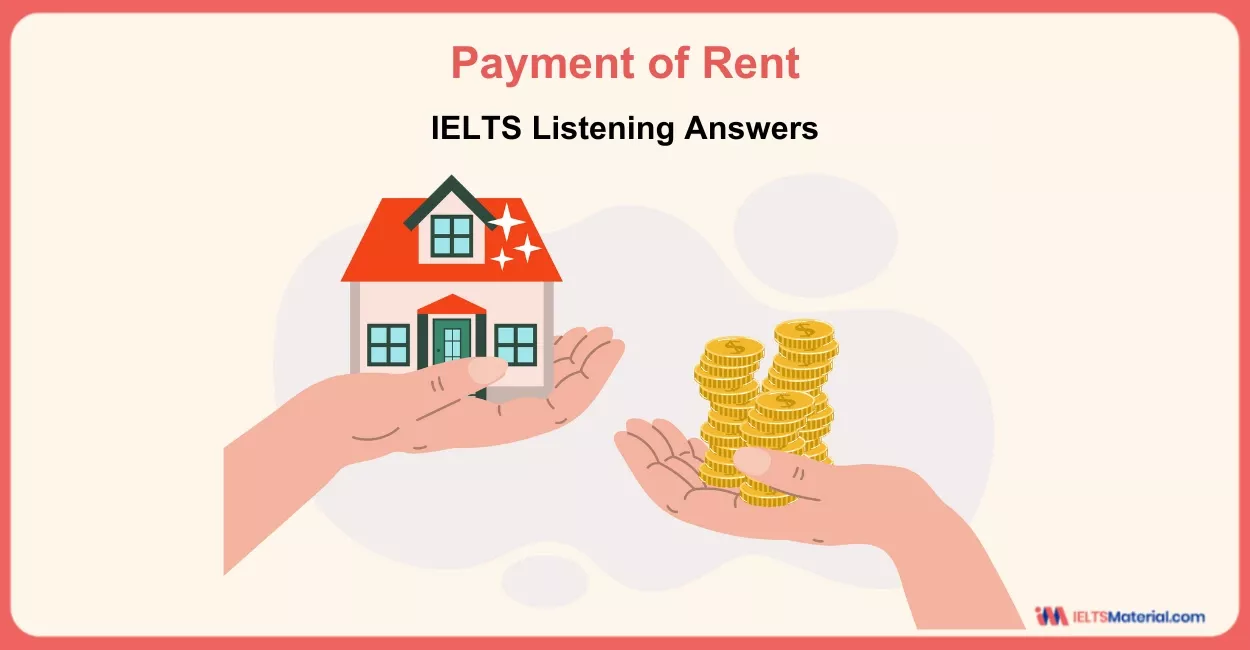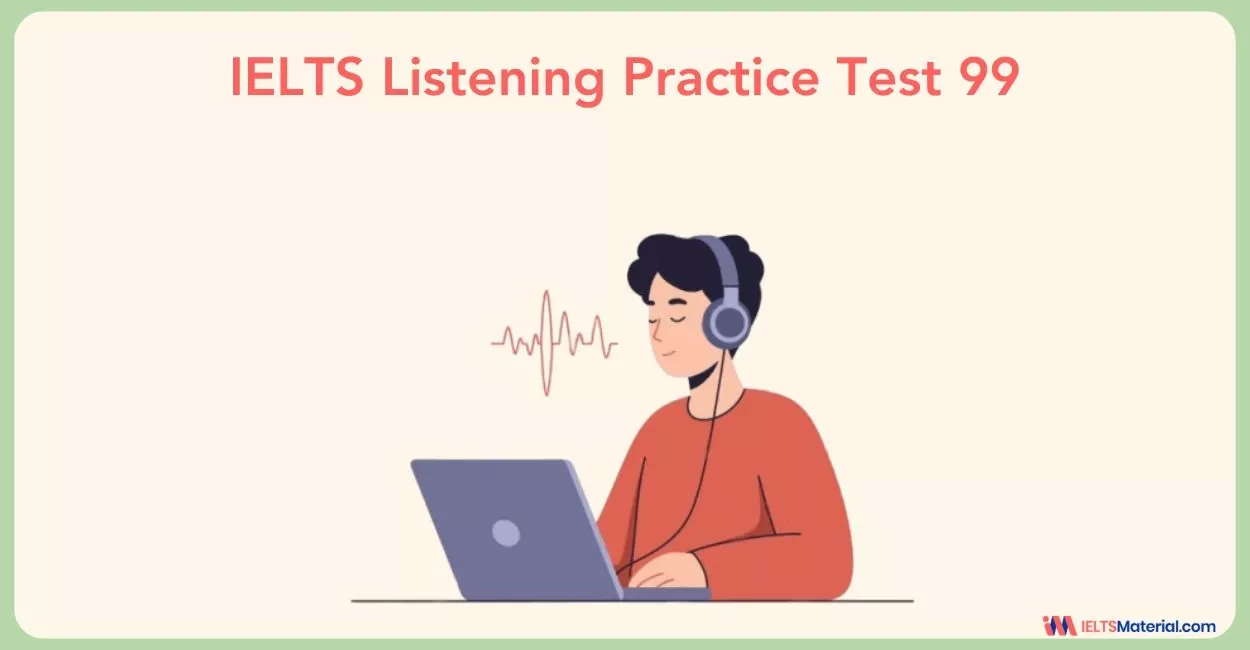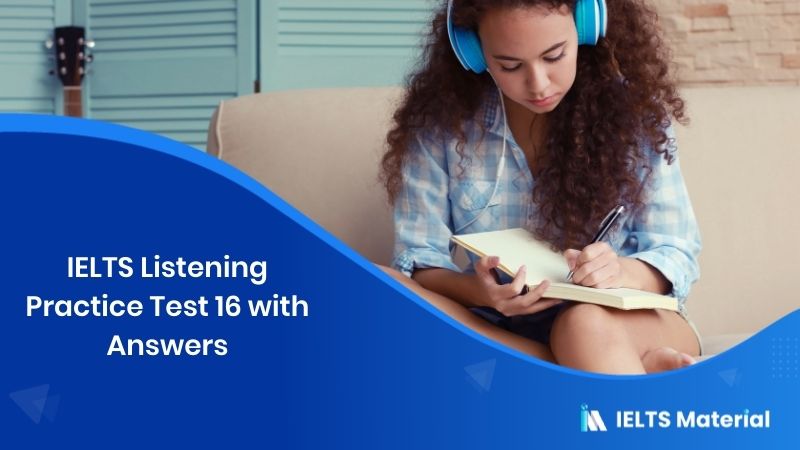IELTS Listening Practice Test 16 with Sample Answers
Level up your IELTS preparation by attempting the IELTS Listening Practice Test 16 with Sample Answers and learn the strategies which you can incorporate to ace the IELTS Exam with a band 8+.
Table of Contents
- Types of Questions in IELTS Listening Practice Test 16
- Tips for Attempting the IELTS Listening Practice Test 16 for Band Score 8+
- Overview of IELTS Listening Practice Test 16 with Sample Answers
- Audio Transcription - IELTS Listening Practice Test 16 with Sample Answers
- Answers - IELTS Listening Practice Test 16 with Sample Answers

Limited-Time Offer : Access a FREE 10-Day IELTS Study Plan!
In the IELTS Listening, there are four sections with sets of questions which one needs to answer within the given time frame. With continuous practice by attempting test papers such as the IELTS Listening Practice Test 16 with Sample Answers, you will be able to enhance your note-taking skills. This is vital for you in order to gain the ability to comprehend information given in the audio, which in turn could be used for attaining a band 8+.
The audio in the IELTS Listening Practice Test 16 with Sample Answers has 4 parts of varying English accents ranging from British to Australian. If you’re not used to them, it is good to take this test first by yourself and then look at the sample answers. This would help familiarize yourself with the different tones and intonations, making you gain the confidence needed to ace the IELTS Exam.
Let's begin, then! Please attempt the test and get your band score in real time!
Are you ready to achieve a band score 8+ in the IELTS Listening Section? Grab our latest Comprehensive IELTS Listening Band 8 Preparation Course now!
Types of Questions in IELTS Listening Practice Test 16
Before diving into the IELTS Listening Practice Test 16, you must be first aware of the types of questions that you will encounter during the test. In each section, multiple question types are going to appear that you need to respond to, which requires different strategies accordingly. Below are the different question types which you might get to attempt in the IELTS Listening Practice Test 16.
Section 1
- IELTS Listening Multiple Choice Questions [Q.1-Q.4]
- Note Completion [Q.5-Q.7]
- Multiple Choice Question [Q.8-Q.10]
Section 2
- Multiple Choice Question [Q.11-Q.13]
- IELTS Listening Sentence Completion [Q.14-Q.16]
- Short Answer Question [Q.17-Q.20]
Section 3
- Note Completion Question [Q.21-Q.23]
- IELTS Listening Sentence Completion [Q.24-Q.27]
- Multiple Choice Question [Q.28-Q.30]
Section 4
- IELTS Listening Summary Completion [Q.31-Q.32]
- Note Completion Question [Q.33-Q.40]
Tips for Attempting the IELTS Listening Practice Test 16 for Band Score 8+
These are some of the strategies to be used while attempting the IELTS Listening Practice Test 16 in order to achieve a band score of 8+. Remember that you are only going to hear the audio only once, so it is very important that you utilize a few strategies so that you can secure a high IELTS Band Score. Let's check out the following tips as you prepare to attempt the IELTS Listening Practice Test 16 with Sample Answers.
- The exam pattern and the types of questions to be expected should be familiarized with. As there are different question types, you must practice all of them with their individual strategies.
- Time management is the key skills which you need to acquire as you hear the audio. Remember that note-taking skill will be helpful in extracting correct answers from the audio.
- Due to IELTS Listening Distractors being used in the listening test, pay attention and make sure that you focus on relevant information before writing down the answers.
- Get used to hearing different accents and get comfortable to it as this would help you comprehend any information in an accent. You could practice by listening to podcasts or audiobooks.
- Listen closely for the key information and understand What is Signposting which would lead you get the correct answer.
- Go through the instructions carefully before attempting to answer the questions.
- Don't leave any questions unanswered and try to complete answering all 40 questions in the IELTS Listening Practice Test 16.
- Use the time allocated for reading the questions, you will be able to find cues about the topic which you will be hearing in the audio.
Ready to boost your IELTS Listening skills? Connect With IELTS Experts & Join our Webinars or personalized guidance and tips.
Overview of IELTS Listening Practice Test 16 with Sample Answers
In Listening Test 16, you will hear 4 audio recordings and answer questions 1-40. The recordings will be played only once.
- Section 1 is a conversation between a student and a saleswoman.
- Section 2 is a conversation between an interviewer and interviewee.
- Section 3 is a discussion among students about a seminar they attended.
- Section 4 is a lecture about some useful information when you go to study overseas.
Audio Transcription - IELTS Listening Practice Test 16 with Sample Answers
Section 1
Question 1-10
Q. 1-4
Select the correct answer from the choices given.
Write A, B, C, or D on your answer sheet.
1 Where is Mr Garcia living?
A Private accommodation
B With friends
C Self-catering university accommodation
D Catered university accommodation
2 Why doesn’t he like his accommodation?
A The food is not good.
B The meals are at inconvenient times.
C He doesn’t like his cohabitants.
D It’s on the university campus.
3 Where are Mr Garcia and his friends from?
A Costa Rica, Spain, Bolivia
B Ecuador, Spain, Mexico
C Mexico, Columbia, Spain
D Spain, Brazil, Argentina
4 What kind of place are they hoping to find?
A A house with a garden next to the university
B A flat or a house next to the university
C A house not too near to the university
D A flat or a house not too near to the university
Q. 5-7
Complete the details below using NO MORE THAN THREE WORDS AND/OR NUMBERS for each gap.
| Name | Manuel Garcia |
| Current address | 5 ____________ |
| Telephone number | 0453 672 348 |
| E-mail address | 6____________ |
| Age | 19 |
| Gender | Male |
| Smoker? | No |
| Budgeted monthly rent | 7____________ £ |
Q. 8-10
Select the correct answer from the choices given.
Write A, B, C, or D on your answer sheet.
8 Why can Mr Garcia expect a small reduction in rent?
A The salesman likes him.
B There is no contract.
C July is a good month to move in.
D He and his friends will stay all year.
9 How much is the accommodation agency’s fee for Mr Garcia?
A 1/2 month’s rent
B 1 month’s rent
C 3/2 month’s rent
D There’s no fee.
10 Which items does Mr Garcia consider necessary?
A Kitchen utensils, washing machine, Internet connection
B Washing machine, Internet connection, TV
C DVD player, TV, Internet connection
D Shower, TV, washing machine
Section 2
Question 11-20
Q. 11-13
Choose the correct answers to the following questions.
Only ONE answer is possible for each question.
11 Which member or members of the speaker’s family have health problems?
A The speaker
B The speaker’s parents
C The speaker’s father and younger sister
D None of the speaker’s family does.
12 Why didn’t the family go to Rotorua?
A They couldn’t afford it
B They wanted to go somewhere with friends
C Because of health problems
D Because they wanted to go somewhere new
13 How did the speaker’s family first find out about the Waiwera spa?
A From people, they met in their home town
B From the Internet
C From people, they met in Rotorua
D From a travel agent
Q. 14-16
Complete the sentences using NO MORE THAN TWO WORDS OR NUMBERS for each gap.
14 Altogether, the number of people in the speaker’s holiday group was ____________
15 One of the children from the other family was then the speaker ____________
16 Before leaving, the speaker and his family got information from the Internet and a ____________
Q. 17-20
Answer the following questions using NO MORE THAN THREE WORDS for each answer.
17 What did the speaker especially like about the holiday? ____________
18 Where were the children most of the time? ____________
19 How does the speaker describe the people at the resort? ____________
20 Which activities didn’t the speaker participate in, even though those activities were available? ____________
Section 3
Question 21-30
Q. 21-23
Complete the notes on what Mika says at the beginning of the discussion.
Mika says that if you miss what other people in a seminar say, it makes it hard to
21 ____________ the discussion. She might have a 22 ____________ if she didn’t understand what a tutor was asking her, but if she was wrong, it was
23 ____________
Q. 24-27
Complete the sentences using NO MORE THAN THREE WORDS for each gap.
24 Martina says that native speaker students often continue talking even if non-native speaker students, like her, ____________
25 However, Martina points out that native speaker students will usually stop talking if you ____________
26 Martina says that non-native speaker students need to anticipate and ____________ in order to get involved in seminar discussions.
27 Michael points out that non-native speaker students can use ____________ and body language to indicate when they are ready to add to a discussion.
Q. 28-30
Choose the correct answer or answers to complete each sentence.
28 Martina thinks that non-native speaker students can improve the situation by being ____________
A aggressive.
B argumentative.
C well prepared.
D polite.
29 Mika thinks that non-native speakers can improve ____________
A both their English and their subject knowledge quickly.
B their English quickly, but not their subject knowledge.
C their subject knowledge quickly, but not their English.
D neither their English nor their subject knowledge quickly.
30 Mika says that ____________
A English students know a lot of technical terminologies.
B English students like making friends with her outside seminars.
C English students arc interested in learning about situations in foreign countries.
D non-native speaker students shouldn’t take much time to state their views.
Section 4
Question 31-40
Q. 31 and 32
Complete the following summary of the lecturer’s introduction by using NO MORE THAN THREE WORDS for each gap.
The lecturer says that he will first look at how some cultural values influence
31 ____________ and that then he will 32 ____________ demonstrating that approaches to learning in one culture may not be considered suitable in others.
Q. 33 and 36
Complete the notes on the way students learn in different cultures.
Use only ONE WORD for each gap.
| 33 ____________ | Arab culture | 34____________of the Koran influences how other subjects are learnt. |
| Chinese culture | Little or no talking or
35 ____________ with other students or teachers. |
|
| Extending | American culture | Focus on developing 36____________skills through questioning, for example. |
Q. 37-40
Complete the notes on three Asian students and their experiences.
Use NO MORE THAN THREE WORDS for each gap.
| Country of origin | Level of study | Experience of own education system |
| China | 37____________ | Students contribute little to discussions. |
| Students 38____________ to ask lecturers questions. |
||
| Japan | Master’s | Less focus on constructing 39 ____________ |
| India | research | 40____________is responsible for providing information about facilities and requirements |
Connect with our IELTS Experts to crack your IELTS Listening and ace the exam with a band 8+! Book a Free Demo
Answers - IELTS Listening Practice Test 16 with Sample Answers
Now, let's compare your answers with the correct ones for IELTS Listening Practice Test 16 and identify the areas on which to improve in order to get a top IELTS band score on IELTS Listening.
Unlock Answer
Signup/Login and get access to the answers
Section 1
| 1. | D |
| 2. | B |
| 3. | C |
| 4. | C |
| 5. | 35C Campus lane |
| 6. | garcianuk@email.uk |
| 7. | 200-250/ 200 to 250 |
| 8. | D |
| 9. | A |
| 10. | B |
Section 2
| 11. | C |
| 12. | D |
| 13. | C |
| 14. | 9/nine |
| 15. | year older |
| 16. | travel agency |
| 17. | (the) accommodation / hotel |
| 18. | (in/ the/ some) play areas |
| 19. | gentle, warm, helpful |
| 20. | basketball and volleyball |
Section 3
| 21. | catch up with |
| 22. | guess |
| 23. | (quite) embarrassing |
| 24. | raise a hand |
| 25. | (just) interrupt (someone) |
| 26. | think quickly |
| 27. | eye contact |
| 28. | D |
| 29. | C |
| 30. | C |
Section 4
| 31. | teaching and learning |
| 32. | present evidence |
| 33. | conserving |
| 34. | Memorisation |
| 35. | interacting/ interaction |
| 36. | argumentation |
| 37. | undergraduate |
| 38. | hesitate |
| 39. | logical argument |
| 40. | Lecturer or supervisor |
Practice Test 15<< >>Practice Test 17
As part of your IELTS preparation for the Listening Section, try as many test papers as you can, such as the IELTS Listening Practice Test 16 with Answers. With time and practice, you will boost your listening skills and gain confidence for the actual exam day. Work on more practice tests and familiarize yourself with the structure, so you can comfortably score an 8+ band in the IELTS exam. Let's roll to the next one and step even closer to success!
Also check :

Start Preparing for IELTS: Get Your 10-Day Study Plan Today!
Explore other Listening Practice Tests

Prity Mallick

Kasturika Samanta

Prity Mallick
Recent Articles

Kasturika Samanta

Prity Mallick

Haniya Yashfeen

Kasturika Samanta





Post your Comments